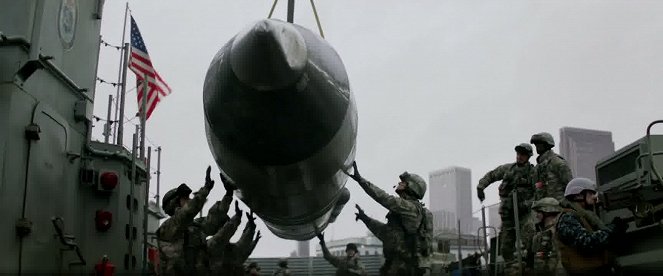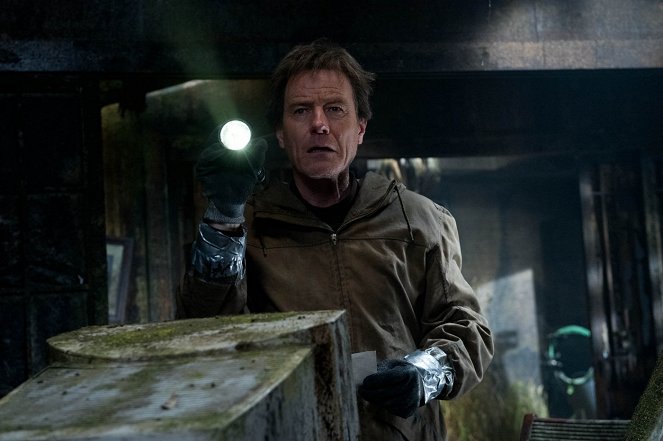Director:
Gareth EdwardsCámara:
Seamus McGarveyMúsica:
Alexandre DesplatReparto:
Aaron Taylor-Johnson, Bryan Cranston, Elizabeth Olsen, Juliette Binoche, David Strathairn, Ken Watanabe, Al Sapienza, Sally Hawkins, Brian Markinson (más)Streaming (5)
Sinopsis(1)
El mítico monstruo japonés vuelve a la gran pantalla en su versión más realista, un épico renacimiento de las emblemáticas películas de la productora japonesa Toho. En ella, el monstruo más famoso del mundo se enfrenta a malvadas criaturas que, animadas por la arrogancia científica de la humanidad, amenazan nuestra propia existencia. (Warner Bros. España)
(más)Videos (24)
Reseñas (20)
De todos los géneros, el que realmente no me gusta mucho es el catastrófico. No entiendo por qué veo a Godzilla repetidamente, a lo mejor es la criatura que me fascina por algo. Sin embargo, la mayor parte de la película es la espera a Godzilla, pero no es una espera hitchcockiana, sino una espera aburrida, rellena de dos mutantes pesados. Si al menos la hubieran rellenado con Elizabeth Olsen, que aparece aquí solo como un adorno. Ojalá la segunda película sea mejor y haya más Godzilla en ella. Entiendo que sería mejor verla en el cine, mi impresión probablemente sería mucho más positiva.
()
Una película que no sale de los clichés seguros, usa la accesibilidad infantil y no sorprende, pero al menos lo mantiene todo unido (Pacific Rim era más audaz y genial, pero dramatúrgicamente no funcional). Además, a diferencia de la versión de Emmerich, respeta las reglas del culto japonés y, con las capacidades técnicas de Hollywood, permite a los japoneses disfrutar de su héroe como nunca antes lo habían visto. Los personajes, aunque interpretados por actores galardonados que no suelen aparecer en los éxitos de taquilla, son secundarios, lo esencial son los elementos épicos y los visuales atmosféricos al estilo de las aventuras de Spielberg. A este director también lo recuerdan escenas específicas como el vuelo inicial del helicóptero a la isla o la colocación repetida de niños en cada evento emocionante. Satisfacción hoy, hace cinco años hubiera sido euforia.
()
Indie directors shouldn’t get into commercial blockbusters, so I wouldn’t look forward to it only to be disappointed. There’s enough action, I believe, but it’s not exciting, which is a far bigger problem than if there was not enough action. The most interesting characters are removed in the first act, and for the remainder of the film, everyone stands staring like a moron, or either think up some bullshit (the bomb here is used in the same weird way as in the last Batman from Nolan) or try to arouse the emotions of the viewer (unsuccessfully). If they had “forgotten” about the story and just let the monsters beat the crap out of each other, it would’ve been better. But they didn’t and the result is painful several times. Visually it’s great, as expected, I would love to print out some frames and hang them on the wall, but when things move it’s really bland. And what pissed me off the most was that the unidimensional protagonist always shows up by chance exactly where the monster is heading. Were the Japanese Godzilla from the past the same? If that is the case, the bullshit has remained bullshit. And I don’t like bullshit.
()
It couldn't have gone better and Edwards delivered what he promised. He artfully walks the line between paying homage to his beloved Spielberg (so that, like Spielberg in Jaws, he entices us with mere hints for much of the runtime) and paying homage to all 29 of Toho's giant lizard movies and the four Godzilla generations that began in 1954 and closed up shop with great aplomb in 2004. Especially with the last two – the alternate reality series and the following new generation series – the new Godzilla has a lot of similarities in characters and narrative style. I laugh at some of the criticisms of the wise-cracking teens here, who at most have seen Emmerich’s movie and marvel (quite rightly, of course) that Godzilla shoots flames, swallows nukes and has legs like an elephant; that’s how they show their ignorance. I applaud Edwards for doing the almost impossible – finding a balance between classic Hollywood and the Japanese poetics of the Godzilla franchise, where everything was, is and hopefully will be possible. PS: The actors here, as with the Japanese originals, are essentially redundant, and the resolution of their family ties is also no different from their Japanese brethren, so it's pointless to fret over it.
()
SPOILERS AHEAD. Godzilla is like playing a video game made up exclusively of cutscenes. The characters are there more or less only so that through their eyes we can marvel at the monsters, which the film tries to obscure much less than in Jurassic Park, for example. The film acknowledges that people are important for it primarily as means of focalisation, so that, for example, we don’t see a fight that was not witnessed by any humans or, at the very least, by a main or supporting character (even though the “earthbound” human perspective here is not maintained as consistently as in Battle Los Angeles). The characters are repeatedly deprived of their agency (the impossibility to rescue one’s wife trapped in the exclusion zone) or it is made explicitly clear that they cannot do much against the monster and they won’t be able to coordinate their actions anyway. The real power belongs to nature and instinct, not to rationally behaving humans (regardless of whether they represent the military or science, or stand apart from established institutions), who are turned into a mere negligible part of an uncontrollable ecosystem (the only time I have felt similar helplessness from an American film was at the end of The Incredible Shrinking Man). People don’t have control over either the present or the future (their plans don’t work out for them); they can only learn from the past, which is an idea that is subordinated to the spiralling dramaturgy of the narrative with clearly indicated parallels between the situation in which Brody senior finds himself at the beginning and the situation in which Brody junior finds himself later. By constantly passivising the human protagonists and the predictability of the one-dimensional characters (the film is built on the most banal gender-based allocation of roles: a woman is a caring nurse, a man is a protective soldier), the Oedipal formula with an absentee father is sidelined in favour of the remarkable transformation of Godzilla, which bears the hallmarks of a villain (indestructibility, terrifying appearance), yet functions as a positive hero in the narrative (because it is the only one that can restore order). Using human characters to causally connect the individual scenes, the plot is developed in such a way that we end up siding with the monster, which is what whole film is about. How else should it be with a monster movie? Before I forget…the film also has brilliant sound effects (after all, using echolocation to track the monsters is one of the motifs of the narrative) and very convincing visual effects (i.e. I believe that a giant lizard could really look and move like that), while also offering breathtaking scenes as if from an art film, impressive only in how they look and how imagery and sound are harmonised within them (the night jump). The bar for other summer blockbusters has been set monstrously high. 85%
()



Anuncio